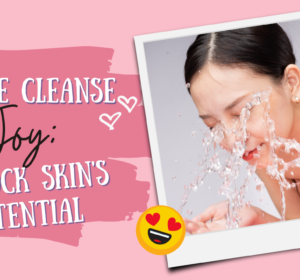The skin is a body organ continuously exposed to external factors like wind, sun, pollutants, etc. All these are responsible for oxidative stress and free radicals production. The term free radical is used frequently, and I am sure you might have heard it several times. But do you know what exactly free radicals are? Do you know how they are produced? And even the most important, do you know you can use antioxidants to fight them?
In this post, I will explain what are free radicals and how to avoid their production. I will also highlight the negative effects free radicals can have on your skin.
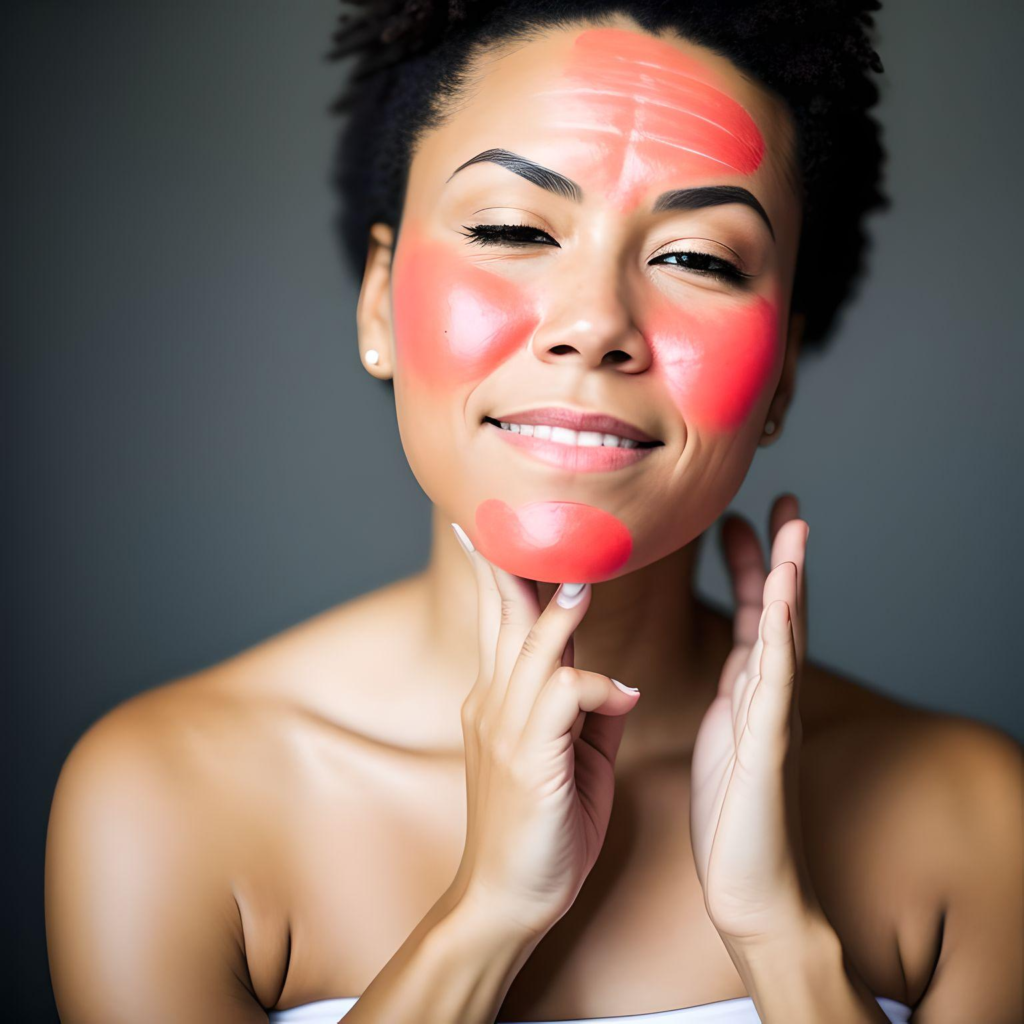
What are free radicals?
To explain what are free radicals we need to travel to the microscopic world. As you may know, the main components of the skin are the cells. The cells are structures with different parts: membrane, cytoplasm with different organelles and nucleus containing the DNA. The composition of these parts is completely different, but they have something in common, they are made of molecules. If we continue travelling down the microscopic levels, we can see that all the molecules are a combination of atoms. The atoms contain three different particles: protons and neutrons in the nucleus and electrons moving around it.
The electrons are the particles responsible for the free radicals production. To increase the stability of the atoms, the electrons are paired with other electrons. However, sometimes, for different reasons, the electrons can be unpaired. That situation is really unstable for the atom, which tends to pair the lone electron as soon as possible. This unpaired electron is going to react with any molecule it finds on the way which will pair the lonely electron and make the atom more stable.

How can we define free radicals?
We can define a free radical as a molecule containing atoms with unpaired electrons. These unpaired electrons will react with the body, or to be more precise, with the body cells, producing damage.
What does trigger free radical production?
Free radicals production can be a consequence of natural factors like cell stress or dehydration. However, most of the time it is a consequence of external factors. These factors include sun exposure, pollutants, smoke, etc.
Free radicals are also known as Reactive Oxygen Species (ROS). The body produces and degrades continuously ROS. They are an important part of the cell metabolism. However, if the number of ROS is very high, a phenomenon called Oxidative Stress appears. This oxidative stress can be a problem for the body.
The body has natural antioxidants which fight the excess of ROS. Oxidative stress is an imbalance between ROS production and activity of the natural antioxidants. When the natural antioxidants cannot fight the excess of ROS the oxidative stress appears.
As we age, the natural antioxidant levels in the body decrease and, therefore, the number of ROS increases. The ROS can appear also due to external factors. One of the most important is the UV radiation. UV radiation is responsible for 80% of the ROS produced in any organism.
Other factors inducing ROS production are air pollutants, smoking, alcohol, pesticides, and poor nutrition.
How does ROS affect the body?
The ROS can affect the DNA, RNA, proteins and phospholipids. When the free radicals damage these molecules they cannot perform their job. That has very bad consequences for the body, like for example acceleration of the ageing process, tissue inflammation and even cancer.
As free radicals affect collagen and elastin, we can suffer from premature wrinkles, pigmentation, uneven skin tone and lacklustre skin among others.
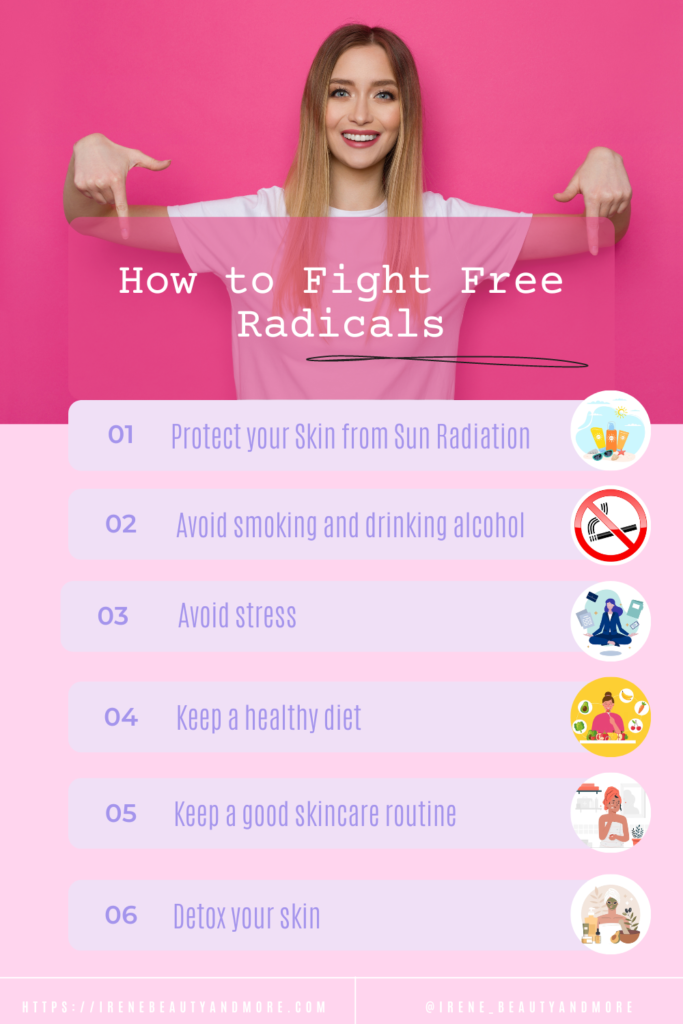
How can we fight free radicals?
There are a few things we can do to prevent free radical production. The most important ones are:
- Protect your skin from sun radiation. You should wear sunscreen every day, independent of the season or weather, even if you are indoors.
- Avoid smoking and drinking alcohol.
- Avoid physical and mental stress.
- Keep a healthy diet, including nutrients rich in antioxidants.
- Do a skin detox once in a while.
- Keep a good skincare routine including anti-ageing face masks. Apply antioxidants as part of your routine.
What is an antioxidant?
I mentioned the importance of antioxidants as part of the diet and the skincare routine. But what is an antioxidant and how can we obtain a benefit from them?
Antioxidants are molecules (natural or man-made) that prevent or delay the damage produced by free radicals. The antioxidants give their electrons to the free radicals. The free radicals don’t need to take electrons from the body cells. As I already mentioned, we can consume antioxidants in our diet or we can apply them as part of our skincare routine.

Antioxidants in the diet
The main antioxidants you should include in your diet are:
Vitamin E. This is one of the most important antioxidants as it can capture oxygen. Vitamin E prevents the oxidation of the cell membrane. Some food rich in vitamin E are vegetable oils (sunflower oil, corn oil, sweet almond oil, coconut oil, olive oil) and nuts.
Vitamin C. Vitamin C inhibits the production of a type of molecule called nitrosamines. These molecules are responsible for some types of cancer. Vitamin C is, therefore, a good molecule to prevent cancer. Citrus fruits, kiwis, spinach and strawberries are some food rich in vitamin C.
Vitamin A and carotenoids. Only animal-origin food contains vitamin A. Vegetable contains this molecule as carotenoids, or in other words, pro-vitamin A. Vitamin A is an excellent molecule to trap free radicals and oxygen molecules. The most important carotenoids are beta-carotene, lycopene and lutein. They are present in red, orange and yellow vegetables (carrot or tomato), eggs and cheese.
Minerals. Minerals are also important in fighting free radicals.
- the element zinc acts in more than 200 enzymatic reactions,
- copper is present in the enzyme superoxide dismutase (SOD) which eliminates the superoxide ion,
- manganese is present in the enzymes found in the mitochondria,
- selenium is part of enzymes which eliminates the peroxide group,
- iron takes part in free radicals production.

Antioxidants in skincare
Applied as part of a skincare routine, antioxidants may have a lot of benefits for the skin:
- Helps to fight signs of ageing. By scavenging free radicals, antioxidants protect collagen and, therefore, fight signs of ageing.
- Helps prevent sun damage. As they are anti-inflammatory, antioxidants reduce the inflammation caused by the sun, preventing sunburns.
- Helps the self-recovery of the skin. Reducing skin inflammation, antioxidants allow better skin recovery.
- Brightens skin tone. Antioxidants reduce photodamage and, therefore, dark spots and hyperpigmentation.
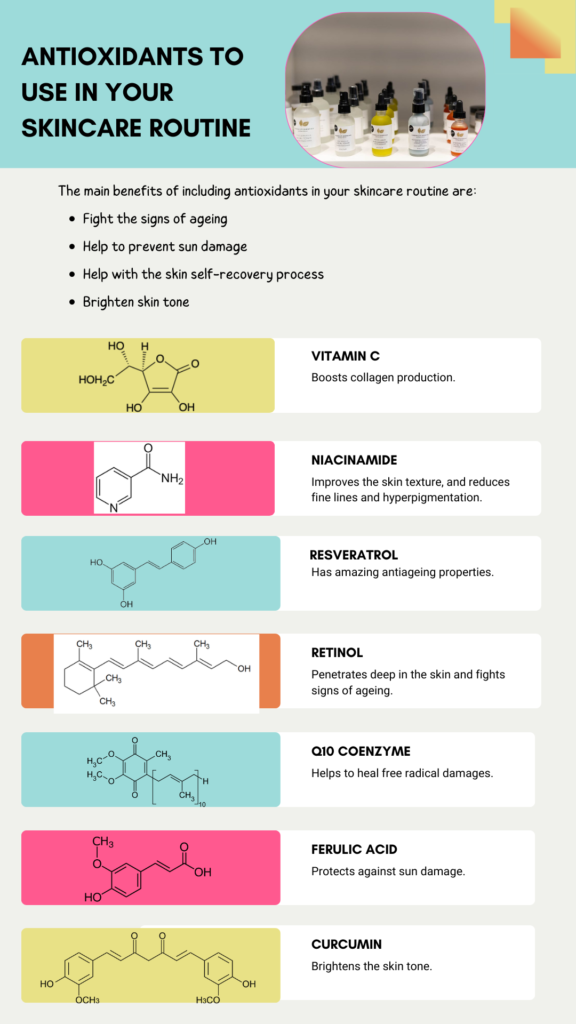
The best antioxidants to apply on the skin are:
Vitamin C. Vitamin C is a free radical scavenger which boosts collagen production.
Niacinamide. The niacinamide molecule improves skin texture and tone. It also helps to reduce fine lines and hyperpigmentation.
Resveratrol. Resveratrol is known as “the longevity molecule” as it has amazing anti-ageing properties.
Vitamin E. Vitamin E accelerates the skin healing process and helps to stabilise other antioxidants.
Retinoids. They are vitamin A derivatives. They are small molecules which penetrate deep into the skin.
Q10 coenzyme. The body naturally produces this co-enzyme, but the levels decrease with age. Q10 co-enzyme helps to heal free radical damage and helps to keep healthy skin.
Ferulic acid. This molecule protects against sun damage. It is more efficient in combination with vitamin C or resveratrol.
Curcumin. It is quite a new molecule in skin care. Curcumin is a polyphenol contained in turmeric root. It has anti-inflammatory and brightening properties. By the way, it doesn’t stain the skin.
In summary, free radicals are important for the body, but in excess, they can produce serious damage. There are a few things we can do to prevent free radical production. That includes protecting your skin from sun radiation and living a healthy life. The use of antioxidants through the diet or applied over the skin is a good help to fight free radicals and reduce the damage they produce.
If you have any doubts or suggestions you can contact me by email.
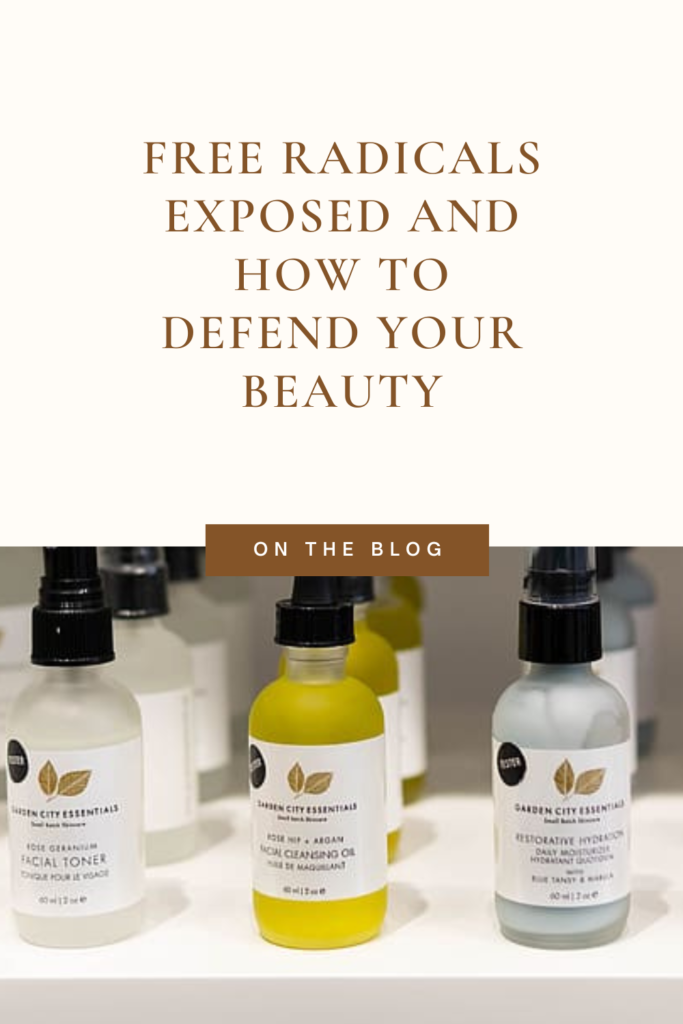
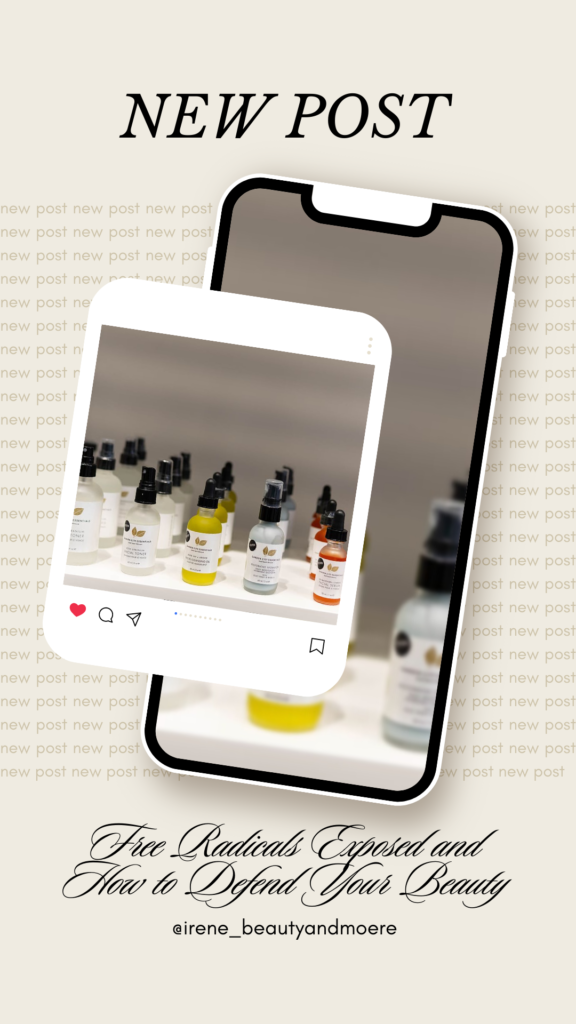
Bear in mind that some of the links in this post are affiliate links and if you go through them to make a purchase I will earn a commission. Keep in mind that I link these companies and their products because of their quality and not because of the commission I receive from your purchases. The decision is yours, and whether or not you decide to buy something is completely up to you.


